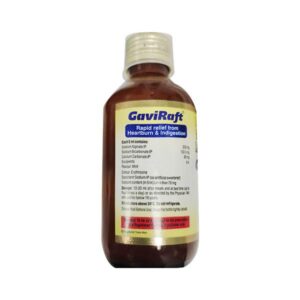CALCIUM CARBONATE + SODIUM ALGINATE + SODIUM BICARBONATE
Calcium Carbonate: Calcium carbonate is a medication commonly used as a dietary supplement and as an antacid. It is also sometimes prescribed to treat conditions associated with low calcium levels, such as osteoporosis and osteomalacia.
The mechanism of action of calcium carbonate as an antacid is based on its ability to neutralize excess stomach acid. It reacts with the acid to form calcium chloride, carbon dioxide, and water. This reaction helps to relieve symptoms of heartburn, indigestion, and upset stomach.
When used as a dietary supplement, calcium carbonate provides essential calcium to the body. Calcium is a mineral that is crucial for bone health, muscle function, nerve transmission, and many other bodily processes. Not getting enough calcium from the diet can lead to weak bones, increased risk of fractures, and other problems.
The recommended dose of calcium carbonate as an antacid is typically 500-1500 mg per day, taken orally as needed. As a dietary supplement, the dose may vary depending on the individual’s age, sex, and specific calcium needs. It is usually taken with meals, as it is better absorbed in the presence of food.
Possible side effects of calcium carbonate include constipation, gas, bloating, and increased thirst. These side effects are generally mild and temporary. However, prolonged or excessive use of calcium carbonate as an antacid can lead to the development of kidney stones or hypercalcemia, a condition characterized by abnormally high levels of calcium in the blood. Individuals with kidney problems or a history of hypercalcemia should use calcium carbonate with caution and under medical supervision.
It is important to note that calcium carbonate can interact with certain medications, such as antibiotics, thyroid medications, and bisphosphonates. Therefore, it is always advisable to consult a healthcare professional before starting or changing any medication regimen involving calcium carbonate.
Sodium Alginate: Sodium Alginate is a medication commonly used to treat symptoms of gastroesophageal reflux disease (GERD) and to relieve heartburn and acid indigestion. It is available over-the-counter and in prescription strength.
The mechanism of action of Sodium Alginate involves forming a gel-like barrier on top of the stomach contents, which helps to prevent the stomach acid from flowing back into the esophagus. This barrier reduces the acidity in the esophagus and provides relief from the symptoms of GERD, such as heartburn and regurgitation.
The typical dose of Sodium Alginate varies depending on the brand and strength of the medication. It is usually taken after meals or before bedtime. It is important to carefully read and follow the instructions provided by the doctor or mentioned on the product packaging.
Common side effects of Sodium Alginate include bloating, diarrhea, constipation, and nausea. These side effects are generally mild and temporary. If any side effects persist or worsen, it is recommended to consult a healthcare professional.
It is important to note that Sodium Alginate is not a cure for GERD or other underlying conditions causing acid reflux. It is primarily used to relieve the symptoms associated with GERD and should be used in conjunction with lifestyle modifications, such as dietary changes and weight management, for optimal benefit. Consulting a healthcare professional is advised before starting any new medication.
Sodium Bicarbonate: Sodium bicarbonate, commonly known as baking soda, is a medication that is used to treat various conditions caused by excessive acidity in the body. It is available as a powder or tablet and can be taken orally or administered intravenously.
The main mechanism of action of sodium bicarbonate is its ability to neutralize excess acid in the body. It reacts with acid to form water and carbon dioxide, thereby increasing the pH and reducing acidity. This makes it useful in conditions such as acidosis, where there is an imbalance of acid-base levels in the body, typically caused by conditions like kidney disease, diarrhea, or diabetic ketoacidosis.
The dose of sodium bicarbonate depends on the individual’s condition and should be determined by a healthcare professional. When taken orally, the usual adult dose for indigestion or heartburn is 325 to 2000 mg, taken every 4 to 6 hours as needed. When given intravenously, the dosage is determined based on the severity of acidosis and the patient’s specific needs.
Although sodium bicarbonate is generally considered safe, it may cause side effects in some individuals. Common side effects include gas, bloating, and stomach upset. In rare cases, high doses or prolonged use may lead to metabolic alkalosis, characterized by symptoms such as muscle twitching, hand tremors, and confusion. It is important to consult a healthcare professional if any concerning side effects occur.
It is important to note that sodium bicarbonate should be used with caution in individuals with certain medical conditions, such as congestive heart failure, high blood pressure, kidney disease, or liver disease. Additionally, it may interact with certain medications, so it is important to inform your healthcare provider of any other medications you are taking.
Overall, sodium bicarbonate is a useful medication for the treatment of conditions caused by excessive acidity in the body. However, its use should always be under the supervision and guidance of a healthcare professional to ensure appropriate dosing and minimize the risk of adverse effects.



